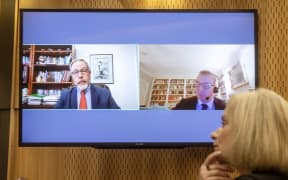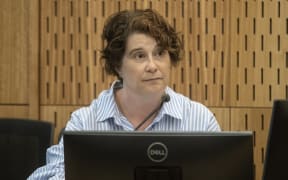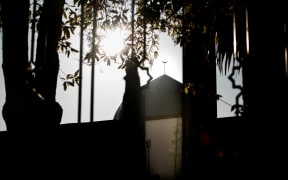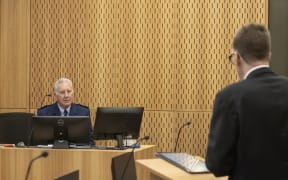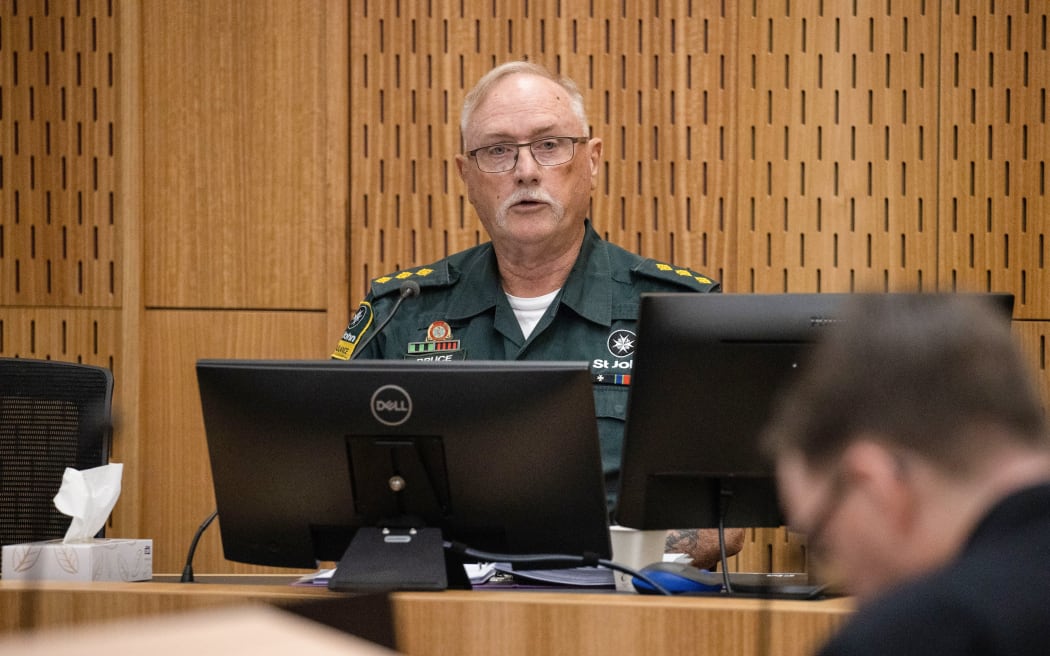
St John's Bruce Chubb. Photo: Stuff / Chris Skelton
A call among senior St John staff amid the Christchurch terror attack has shown the confused and chaotic information being discussed to coordinate a response.
Bruce Chubb, St John's duty centre manager on 15 March 2019, is giving evidence in the inquest into the deaths of 51 worshippers at Al Noor Mosque and Linwood Islamic Centre.
During his evidence, the audio of a call set up to discuss the incident with about 20 St John leaders was played.
The call began just prior to 2pm on the day of the attack.
It showed that St John still believed only four or five people were victims of the incident more than 20 minutes after the first shooting began at Al Noor Mosque.
It took St John staff about half an hour to enter the Deans Avenue mosque to provide medical assistance to victims.
It was not until 2.07pm that Chubb can be heard on the call learning that there were up to 50 patients.
"I'm just going to interrupt you all," Chubb said in the call.
"We've now had a confirmed number of between 40 and 50 patients at the mosque in [Deans] Ave."
The audio also shows senior staff discussing how best to respond to the incident and how it would set up an area for handling "multiple casualties" outside of the hospital.
Hagley Park was considered a "dangerous place" for such a centre, one person on the call said.
Chubb told St John counsel James Wilding the leadership call was "difficult" and "challenging" given the circumstances.
Escalating such an incident to those higher up in St John had changed since the terror attack, he said.
A national operations centre had been set up, run 24/7 out of Auckland.
It meant if an incident such as this ever happened again, he would contact the operations centre and they would take over organising a leadership team meeting.
It would leave him - or any other duty manager - freer to support their team and manage the response.
During cross-examination, Chubb conceded that St John was not in constant communication with police as it should have been during the response.
The communication between the two agencies is a key issue in the inquest, and much of the evidence has pointed towards a breakdown.
Chubb agreed, saying "clearly something didn't work".
But he said 15 March was an "exceptional day" and St John simply had no understanding of how quickly the incident was unfolding.
At the time, he did not recognise a communication breakdown as St John was still getting information.
"We were getting updates from police, but not necessarily all the updates because as police needed to do what police need to do, it takes time for them to gain an understanding and then update us."
He agreed with other witnesses that having a senior St John staffer sitting alongside police's incident controller would have been beneficial - but was not something he thought of at the time.
"On the day, I think that the circumstances that surrounded this event were so overwhelming, everyone focused on doing their best in the shortest possible time, and as I alluded to before, the police had an exceptionally difficult task.
"We could only support them when they were able to provide the information for us to do so."
Chubb said he would "absolutely" organise a St John member to sit with police if something like 15 March ever happened again.
When asked about the length of time it took in getting ambulances to the Linwood Avenue scene, Chubb said he was not aware they had been asked for.
The inquest has previously heard from a number of police witnesses who had requested ambulances to the scene - but it appears it did not get through to St John.
Chubb said the requests for ambulances would not have necessarily made him send them straight away - but he would have asked for a Safe Forward Point, made sure it was safe for paramedics to attend and find out who they should liaise with.
He would not have simply ignored the request, he said.
Chubb told the inquest he had not had any training that prepared him for an incident such as the mosque attacks - and none since.
It would be helpful "to be fair", he said.
The inquest will examine the following 10 issues over seven weeks:
- Events of 15 March 2019 from the commencement of the attack until the terrorist's formal interview by police
- Response times and entry processes of police and ambulance officers at each mosque
- Triage and medical response at each mosque
- The steps that were taken to apprehend the offender
- The role of, and processes undertaken by, Christchurch Hospital in responding to the attack
- Coordination between emergency services and first responders
- Whether the terrorist had any direct assistance from any other person on 15 March 2019
- If raised by immediate family, and to the extent it can be ascertained, the final movements and time of death for each of the deceased
- The cause of death for each of the victims and whether any deaths could have been avoided
- Whether Al Noor Mosque emergency exit door in the southeast corner of the main prayer room failed to function during the attack and, if so, why?
The inquest continues.
